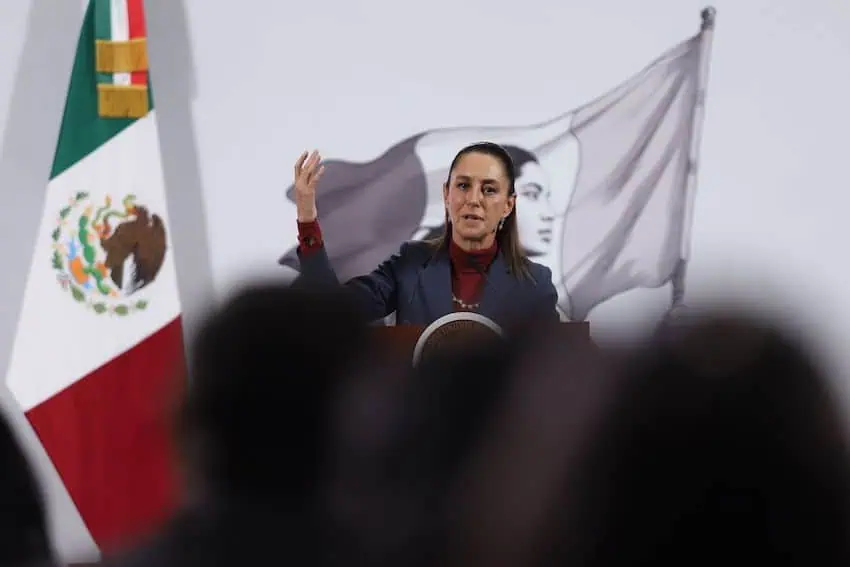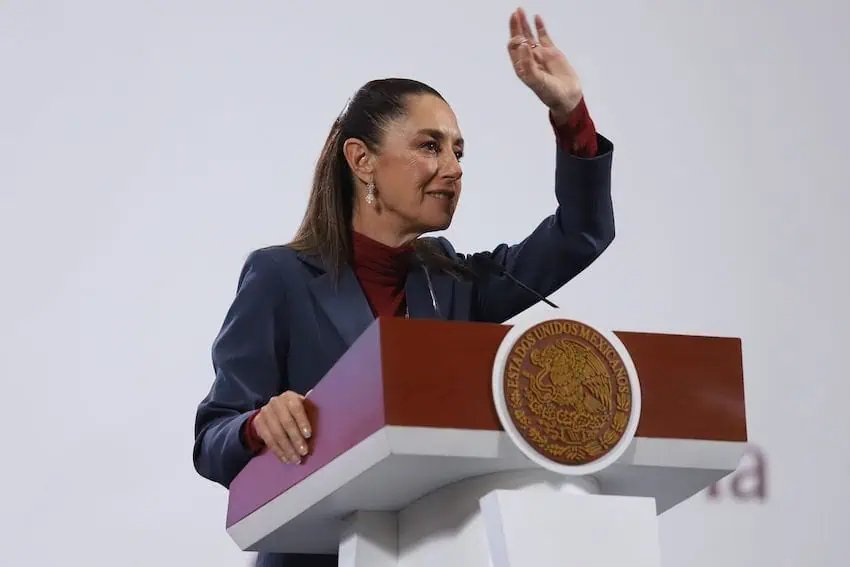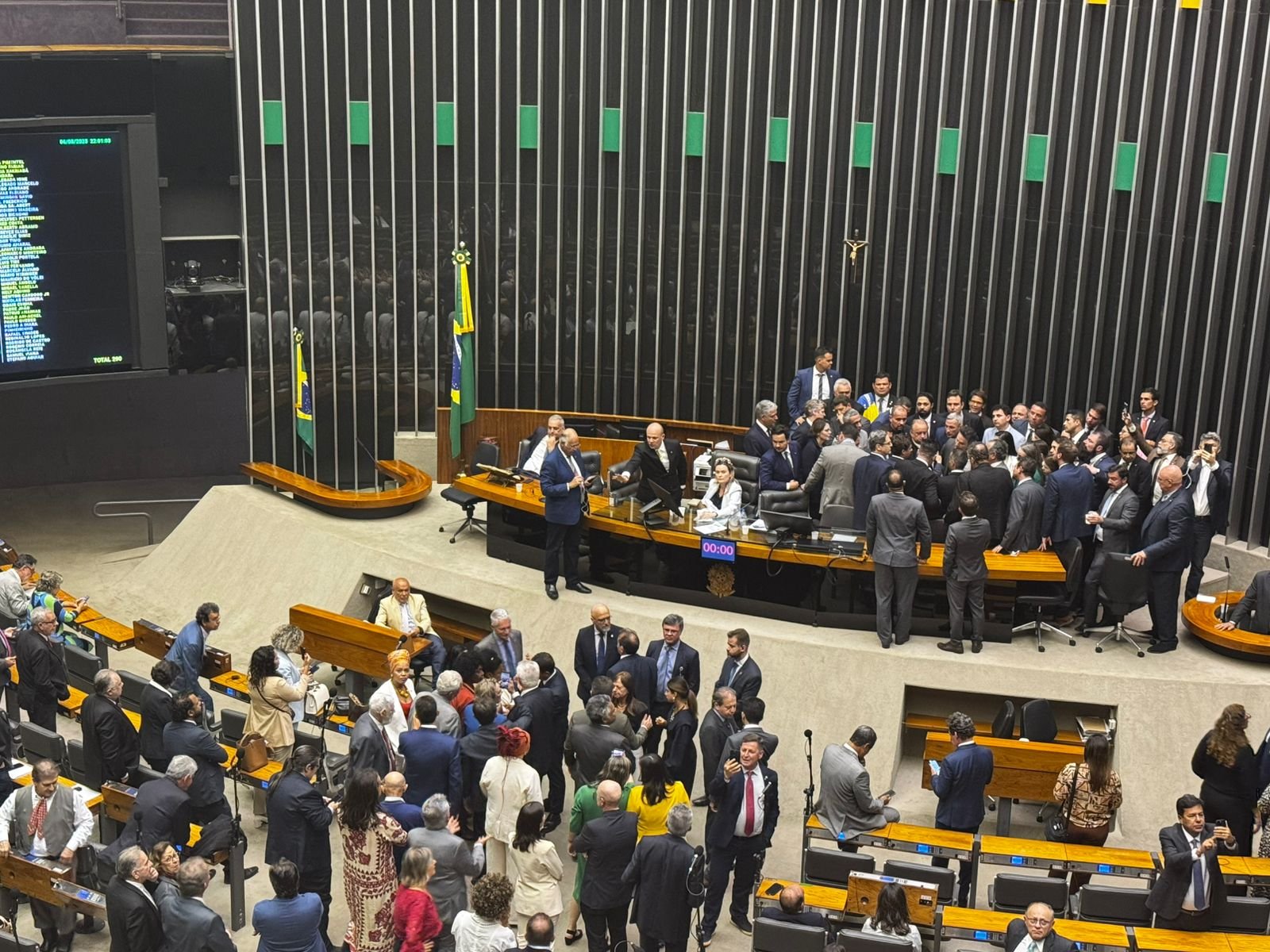Issues pertinent to the relationship between Mexico and the United States were a key focus of President Claudia Sheinbaum’s Wednesday morning press conference.
Here is a recap of the president’s Aug. 6 mañanera.
‘We’re against the death penalty’
A reporter noted that prosecutors in the United States won’t seek the death penalty in their cases against the “Mexican capos” Ismael “El Mayo” Zambada and Rafael Caro Quintero.
Zambada was arrested in the United States in July 2024 after he was allegedly kidnapped in Sinaloa and forced onto a U.S.-bound private plane, while Caro Quintero is one of 29 cartel figures who were extradited to the U.S. in February.
Both men have pleaded not guilty to accusations they face in the United States. The Associated Press reported on Tuesday that it was “unclear whether taking the death penalty off the table signals any possibility of a plea deal with either or both men.”
The aforesaid reporter asked Sheinbaum her opinion on the matter, saying that the decision not to seek the death penalty in cases against Zambada and Caro Quintero could mean that the two men are coming to some kind of agreement with authorities in the United States.
“We’re against the death penalty, no matter the crime,” the president responded. “It’s not something we agree with.”
Sheinbaum stressed that opposition to the death penalty is “part of Mexican policy” and not a “personal issue.”

She said that in “all” of Mexico’s extradition treaties, “reciprocity” with Mexican laws is established, meaning that Mexicans sent abroad can’t be subject to the death penalty even if the country they are extradited to allows capital punishment.
“So when … [Mexicans] are extradited, there is no death penalty,” Sheinbaum said.
In all cases when Mexicans face criminal charges abroad, “what Mexico seeks is reciprocity with our laws,” she said.
“It has nothing to do with the person or the criminal, but rather with the fact that we don’t agree with the death penalty,” Sheinbaum said.
Sentences in US against men convicted of trafficking weapons to Mexico a ‘good sign,’ says Sheinbaum
A reporter noted that six people were recently sentenced in the United States for trafficking weapons to Mexico, and highlighted that U.S. Ambassador to Mexico Ronald Johnson commented on the case.
The United States Attorney’s Office in the Middle District of Florida announced on Friday that six men had been sentenced for trafficking military-grade firearms to Mexican drug cartels. The sentences range from 1.5 to nine years in federal prison.
In a post to social media on Monday, Johnson said that “the case of six Florida men sentenced for trafficking military-grade firearms to Mexican cartels reaffirms [the United States’] commitment to stopping the flow of illegal weapons into [Mexico].”
El caso de los seis hombres en Florida que fueron sentenciados por traficar armas de grado militar a cárteles mexicanos reafirma el compromiso de 🇺🇸 para frenar el flujo de armas ilegales hacia 🇲🇽. Seguiremos colaborando, bajo el liderazgo de @POTUS @realDonaldTrump, con la…
— Embajador Ronald Johnson (@USAmbMex) August 4, 2025
“Under the leadership of @POTUS @realDonaldTrump, we will continue working with President @ClaudiaShein and her team to dismantle these networks,” the ambassador wrote.
Sheinbaum was asked whether the sentences indicated that the United States government is “paying attention to the demands” of the Mexican government, which has long called on the U.S. to do more to stop the southward flow of firearms.
“Yes,” she responded.
“Of course, we’re going to continue insisting that … [they do] even more, but it’s a good sign that people have been arrested [in the U.S.] for arms trafficking,” Sheinbaum said.
She said that in conversations with U.S. officials, including Ambassador Johnson, Mexican officials have “always” advocated in favor of the U.S. taking action to prevent the trafficking of weapons to Mexico.
Many of the firearms that are smuggled into the country end up in the hands of members of organized crime groups. Those weapons are commonly used to commit serious crimes in Mexico, including murder.
New ‘border unit’ established in Sonora
In another social media post on Monday, Ambassador Johnson said that “the new Border Unit in Sonora is a concrete step to stop the flow of illicit drugs, weapons, and people, while boosting trade and community ties.”
“A secure border benefits both countries — creating an environment where citizens can prosper. Border security is a shared priority — driven by the leadership of @POTUS @realDonaldTrump and President @ClaudiaShein,” he wrote.
Sonora Governor Alfonso Durazo said on Friday that 18 state police officers who are part of the new unit had completed “specialized training” with U.S. Customs and Border Protection (CBP).
Como parte de la nueva División de Operaciones Fronterizas, hoy 18 elementos de la Policía Estatal concluyeron su capacitación especializada con la CBP de Estados Unidos.
Un esfuerzo binacional que refuerza nuestra presencia institucional en la frontera, con profesionalismo y… pic.twitter.com/VPxiCD2fsR
— Alfonso Durazo (@AlfonsoDurazo) August 1, 2025
Sheinbaum said that the establishment of the new border unit is “part of the agreements” between Mexican and U.S. authorities. The neighboring countries are expected to sign a new security pact soon.
Sheinbaum highlighted that Mexican states have their own agreements with U.S. authorities. She told reporters that Baja California has an agreement with the CBP and that Sonora “also has agreements” that involve the sharing of information with U.S. authorities.
“If there is a criminal who crosses the border from the other side, you obviously have to have information,” Sheinbaum said.
“…. Now that there is the presence of the United States army on the border, there has to be communication,” she said.
“There is communication between the National Immigration Institute and CBP, and there is communication between [Mexican] Customs and CBP as well. There is communication between the governors of [border states] and their counterparts,” said Sheinbaum, who noted that Mexico also collaborates with Guatemala on security issues at their shared border.
“Due to the entry of police from Chiapas to Guatemala, a meeting was held, agreements were formalized and now there is more collaboration,” she said.
By Mexico News Daily chief staff writer Peter Davies ([email protected])




